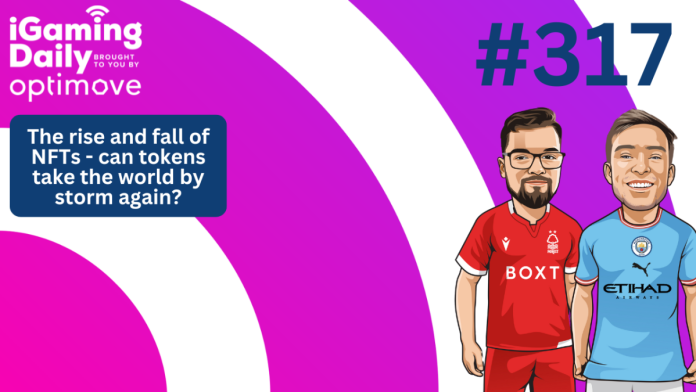Although NFTs may have faded in the memories of many, they hit the news again earlier this week when US giant DraftKings announced the closure of its NFT marketplace, Reignmakers.
On the latest episode of iGaming Daily, supported by Optimove, Payment Expert’s Editor, Ted Orme-Claye, and Senior Journalist, Callum Williams, reacted to the news and also looked back on the rise and fall of NFTs.
NFTs grew to prominence in 2020 and 2021 during the COVID-19 pandemic before the market took a downturn in 2022.
Examining the rise and fall of the product, Callum said that part of the problem was the short-term thinking of those buying into the space.
He said: “Ownership was very big, but I think it got lost because of the celebrity endorsements and there were pieces being bought for millions of dollars.
“It’s also kind of indicative of how people have short-term attention spans [because] it was not expected to be a long-term type of thing. It’s not a bad idea but I don’t think anyone was taking in long-term projections of what NFTs could be during the boom period. I don’t think there was many people looking into what was going to happen in the next several years.”
Ted also suggested that the rise and subsequent fall in interest could have been caused by people having more spare time due to the lockdowns in place and then when the lockdown was lifted people returned to their pre-covid interests.
Although DraftKings has chosen to shutter its NFT marketplace, there are still use cases for the technology across the sports and retail industries.
Serie A team Lazio, alongside their sponsoring partner Binance, have started to use their matchday tickets alongside NFTs and fashion brands Dolce & Gabbana and Nike offer digital collection fashion pieces.
Callum explained that he believes NFTs could have a “second cycle” due to their potential uses in the retail space.
“I see NFTs moving into a second cycle looking at more retail value,” he explained. The more they’re being used in a consumer sense [the more] consumers are going to have more confidence in them.
“I think we are going to look at NFTs in a more loyalty and reward sense. A company is now going to look at not just giving out email receipts but then turning those email receipts into an NFT that can track data and your past shopping experience. I think in these types of real-world experiences NFTs can definitely provide real-world benefits.”





